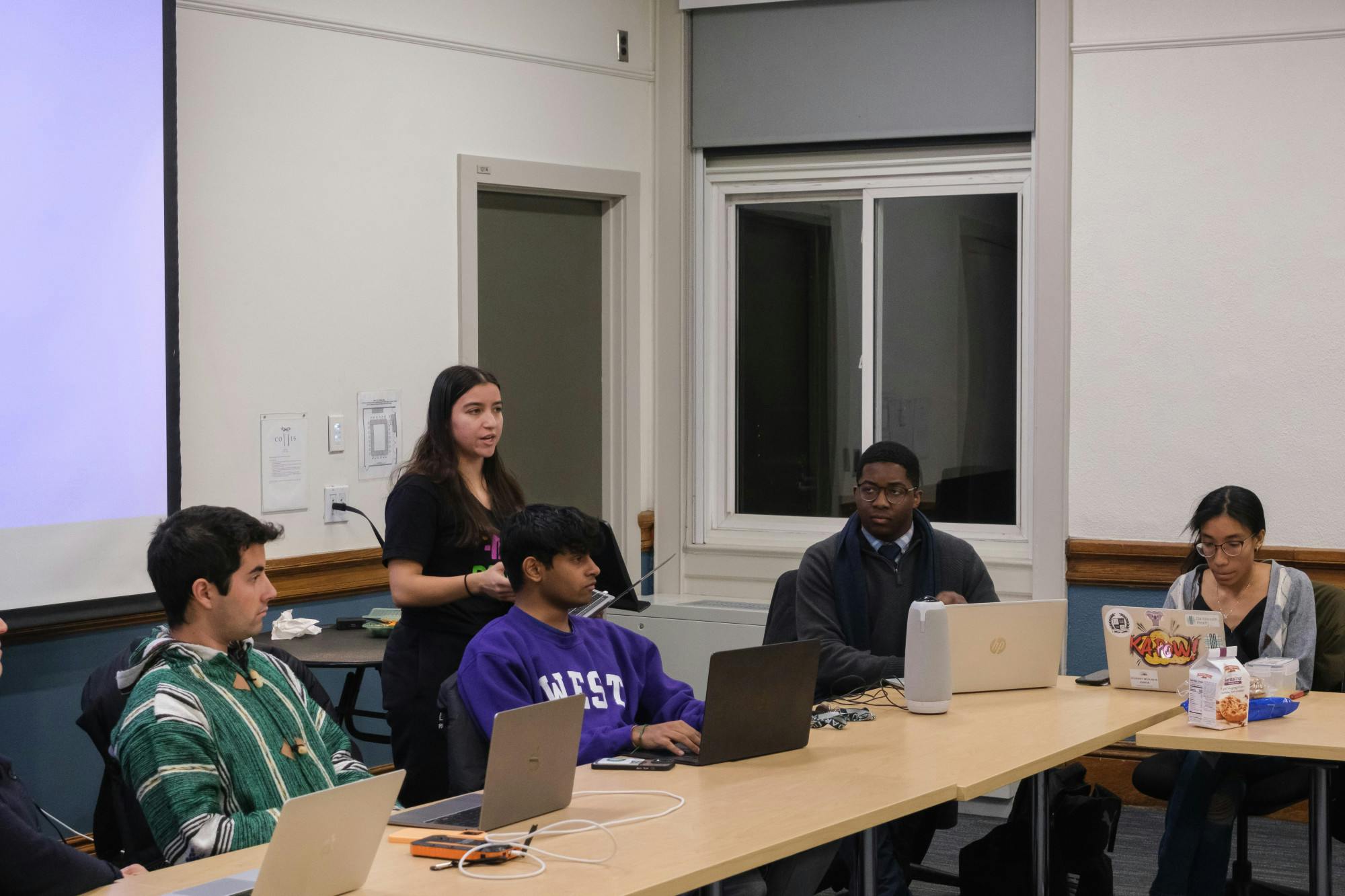On Feb. 4, the Dartmouth Student Government Senate met for its fourth weekly meeting of the winter term. Led by student body president Jessica Chiriboga ’24, the Senate discussed updates on student issues and spoke with Hanover Selectboard member Jennie Chamberlain about the zoning amendments.
On behalf of the Mental Health Committee, North Park Senator Chukwuka Odigbo ’25 and School House Senator JJ Dega ’26 shared that Therapists of Color New England will now offer teletherapy to Dartmouth students at no cost. According to its website, the practice specializes in providing a “safe and affirming space” for individuals in marginalized communities, such as people of color and LGBTQ+ individuals.
In the fall term, students had expressed concerns about the College lacking Black counselors after former counselor Paris Palmer left in Sept. 2023, according to previous coverage by The Dartmouth.
Students who would like to be referred to Therapists of Color New England should contact the Counseling Center at 603-646-9442. They can also schedule an appointment by calling 603-787-3140 and identifying themselves as a Dartmouth student or by contacting Therapists of Color New England through their website.
Dega also shared that the Student Wellness Center will provide Greek houses with 37 24-packs of Spindrift seltzers to increase access to non-alcoholic beverages during a time of “higher need.” He explained that this is a one-week expansion of the SWC’s Polar Project, which typically provides non-alcoholic beverages to Greek houses.
Additionally, DSG purchased 20 sun lamps for students to check out for one to two weeks at a time to relieve symptoms of Seasonal Affective Disorder, according to Dartmouth College Health Service. Ten of the new sun lamps will be available through the SWC, five at the circulation desk in Baker-Berry Library and five at Collis Center, which DSG will use to launch a check-out program.
Student body vice president Kiara Ortiz ’24 stated that the Dining Advisory group met to discuss Dartmouth Dining’s role in reducing food insecurity on campus.
According to Ortiz, Dartmouth Dining director Jon Plodzik spoke at their meeting about increasing the amount of Dining Dollars, also known as DBA, in the Ivy Unlimited plan. According to Dartmouth Dining, the Ivy Unlimited plan is mandatory for first-year students and currently includes $250 in DBA per term.
A document of students’ frequently asked questions about Dartmouth Dining collected by the DSG was also sent to Dartmouth Dining. Ortiz described Dartmouth Dining as “willing and committed to answering” these questions.
Chiriboga and chief of staff Anthony Fosu ’24 then discussed their meeting with Senior Vice President and Senior Diversity Officer Shontay Delalue and Vice President for Culture, Belonging and Strategic Engagement Chloe Poston in the Division of Institutional Diversity and Equity.
IDE plans to collect qualitative data from student focus groups about “the intersections between identity, engagement and culture,” Chiriboga said. This data will supplement the quantitative data IDE has already collected.
DSG will help IDE create focus groups, which will be organized based on student participation, or lack thereof, in Greek life and varsity athletics. Fosu explained that these categories were chosen to maximize the representation of students involved in various activities.
“Of the eligible students who can, 60% are affiliated with Greek life, and a slight majority… are also involved in athletics,” Fosu explained. “We’re trying to cover as much of campus as possible.”
Chamberlain then spoke to DSG in a personal capacity about the importance of zoning legislation. She summarized zoning laws as defining “what can be built where” and explained that current zoning ordinances are responsible for the housing crisis, climate crisis and affordability crisis.
“When a lot of people are talking about equity and access, it often feels like, ‘How can we really help people who are really disadvantaged?’” she said. “I want to take a step back and say … it’s not just about helping the disadvantaged; it’s about helping the entire community in a really smart way.”
Hanover planning and zoning director Robert Houseman has currently written three proposals to “bring housing closer to downtown [Hanover] and campus,” Chamberlain said.
The first proposal removes parking minimums from zoning and would no longer require new constructions to also build a minimum number of parking spaces. According to Chamberlain, mandating parking spots unnecessarily increases costs for businesses and residents because they take up limited space.
“If you have this great private equity firm, maybe you also want to provide a very great parking spot, so someone can roll up in their Bentley and get maximum service, but if you [have] an ice cream store that wants to just [hand] out delicious treats, maybe you don’t want to be in the parking spot business,” Chamberlain said. “The ice cream business is overwhelmingly walkable.”
The second proposal would raise permitted building heights, and the third would expand options for the building types that can be built around downtown Hanover.
During the meeting, DSG voted 9-6 to pass a postponement on the vote on whether DSG should provide vocal support for the proposals in front of the planning board. In an email statement, DSG-Hanover town liaison Nicolás Macri said the DSG voted 13-0-0 on GroupMe on Feb. 5 to the question, “Should DSG publicly support the zoning amendments (missing middle housing, parking mandates repeal, downtown building height and essential services) as presented by Robert Houseman?”
DSG liaisons attended the Planning Board meeting on Feb. 6 in an official capacity to advocate for the zoning amendments and will continue to do so going forward, Macri said.
DSG Senate meetings occur weekly on Sundays at 7 p.m. in Collis 101 and are open to all students.
Corrections (Feb. 15): A prior version of this article misrepresented the title of Robert Houseman and also the contents of the first proposal.
Annabelle Zhang '27 is a reporter and editor from New Jersey. In the classroom, she studies Geography and Government modified with Philosophy and Economics. She enjoys creating recipes, solving puzzles and listening to music.




